#publius claudius pulcher
Text
>Be Publius Claudius Pulcher. No, not THAT one, you're his ancestor during the First Punic War.
>Be so sexy (pulcher) that all your descendants are named the Sexy Claudii after you.
>So sexy. But so stupid.
>Nevertheless you are Hot, Rich and Famous Enough to get elected consul for 249 BCE, just in time to lead Rome's navy against the Carthaginians in battle.
>Hold up. "Navy?" Boats are for LOSERS. How are you supposed to look cool shanking Carthaginians if they're on another boat?
>You and a hundred other smelly unwashed dudes are crammed onto a dumb pointy boat with some fucking chickens. Sacred chickens. Because birds are messengers of the gods or some shit like that.
>You can see the enemy ships right there but nooo you're not allowed to attack them until the chickens are cool with it, and the chickens won't fucking eat.
>You did not spend oodles of sesterces to become consul and blow lunch over the side of a stinky boat just for chickens to tell you what to do.
>If they will not eat then let them DRINK. You hurl the chickens off the boat and command the fleet to plow full speed ahead.
>Carthage beats your ass so bad Rome doesn't attempt to fight a sea battle for seven years, and the Carthaginians comfortably put most of their ships in reserve.
>You are hauled in front of the Senate, charged with treason and sacrilege, exiled, and die soon afterward.
>Your sexiness, however, lives on.
378 notes
·
View notes
Text

dolabella cringe compilation / oxford classical dictionary entry
#‘embarrassing cicero by (unsuccessfully) prosecuting ap. claudius pulcher’…………#publius cornelius dolabella#beeps
35 notes
·
View notes
Text
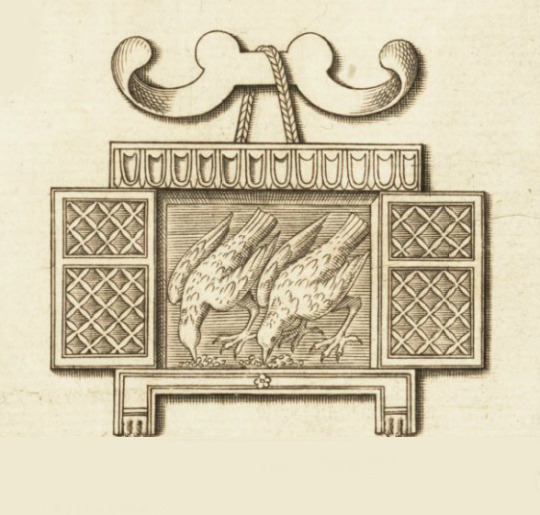
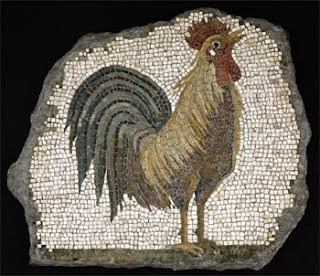
The Sacred Chickens of Ancient Rome
In Ancient Rome the Sacred Chickens were a roost of…sacred chickens that were used for divination by Roman priests. Revered for their ability to give portents of the future, the chickens were attentively raised and kept by the priests, hence why depictions of Roman priests often show them with chickens.
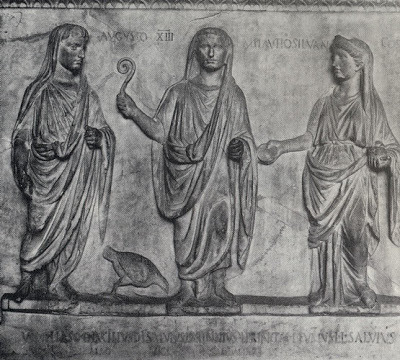
To use the Sacred Chickens for fortunetelling, feed would be spread around the ground and the chickens set loose. If the chickens ate voraciously then a favorable outcome could be expected. If not, then an unfavorable outcome was expected. If a favorable outcome was needed, then the chickens would be kept in cages for a period of time without food before being set loose, which seems to me no different than shaking a magic eight ball repeatedly until you get the right answer. Regardless, the portents of the Sacred Chickens were taken very seriously, and matters of state or military were not conducted until first consulting with the chickens.
In 249 BC during the First Punic War, the Roman Consul Publius Claudius Pulcher was leading a fleet of 120 Roman warships on a surprise attack on the Carthaginian port of Drepana. When feed was spread out on the deck of the ship, the chickens refused to eat, signaling that the attack was doomed to failure. Pulcher, believing the Sacred Chickens to be superstitious nonsense, ordered the chickens cast overboard exclaiming “Bibant, quoniam esse nolunt” (Let them drink if they will not eat) . The morale of the Roman fleet spiraled downward. After all how could one conduct a successful military campaign without good portents from the Sacred Chickens? When the fleet attacked the port, it made a clumsy and slow advance against the harbor, thus losing the element of surprise. The Carthaginian fleet quickly mobilized and attacked the Romans, sinking or capturing 93 Roman ships. Ignore the Sacred Chickens at your own peril!
Of course today we know it is unlikely that the Romans lost the battle because of the Sacred Chickens. Fortunately today in our modern societies we do not take such superstitions seriously. Oh BTW Punxsutawney Phil didn't see his shadow, so spring is around the corner! Better go get my snow tires removed.

99 notes
·
View notes
Text
the thing about my immortal's "(that's how i got my name)" is how it inadvertently encapsulates the nature of certain roman names. hi my name is marcus tullius cicero and i have a cecil-shaped mole on my nose (that's how i got my name). hi my name is publius cornelius scipio africanus and i conquered africa (that's how i got my name). hi my name is publius claudius pulcher and im a major fucking hottie (that's how i got my name).
816 notes
·
View notes
Text
what the HELL is this @/publius claudius pulcher?????? your coward ass is always hiding behind press releases. you are a SPINELESS LOSER. you're still patrician and that's FINAL.
48 notes
·
View notes
Text
sometimes i wonder what it would have been like to be on publius claudius pulcher's ships. like imagine youre a roman soldier heading to carthage to fight and this guy gets the worst fucking possible omens from the sacred chickens and instead of turning the ship around he throws the chickens into the ocean, makes you go into battle anyway, and gets so utterly ass-blasted that it takes 7 years for the romans to rebuild their fleet, and now youre drowning while carthaginian ships sail all around you. all because this bitch didnt listen to the chickens
398 notes
·
View notes
Text

Publius Claudius Pulcher
4 notes
·
View notes
Text
btw this is so terrible for me. publius claudius pulcher, but he exists in like. the early few years of the social war, serving in the war. and i am confused and i don’t get it. is it clodius or is it some other guy who i can’t fucking find on a family tree. sobbing and throwing up.
5 notes
·
View notes
Text
Chapter 56: Catalina
When consular elections were held that year, such was the flagrant use of bribery by the winning ticket that the senate quickly annulled the results and called for a new election in October.
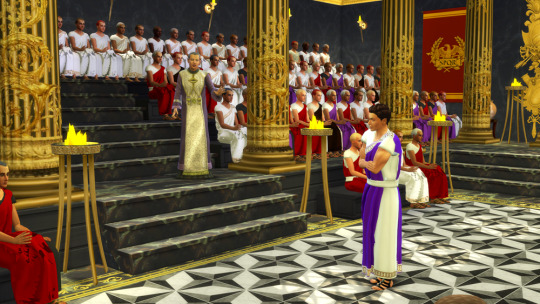
On this occasion, Catalina took the opportunity to submit his name as a candidate, but Pius was more than ready – calling on the senate for a ruling that only the original candidates would be able to stand.
In a fury, Catalina began hanging about with unsavory company, walking the forum with violent ruffians, making threats and kicking up trouble whenever he had the chance.

“Some in the senate have already demanded his censure,” Cicero said. “Unfortunately, his advocates among the aristocracy are shielding him.”
“I should have thought Catalina much to uncouth for their tastes,” Quintus said.

“Even the boni know how to make use of a street fighter when the occasion demands it,” Atticus observed. “After all, many a cultured household is protected by a savage dog or two.”
Still, no one had volunteered to take on the Africans’ case against Catalina – much to Cicero’s relief – until one day one of Cicero’s former students, Marcus Caelius Rufus, rushed into my master’s library.
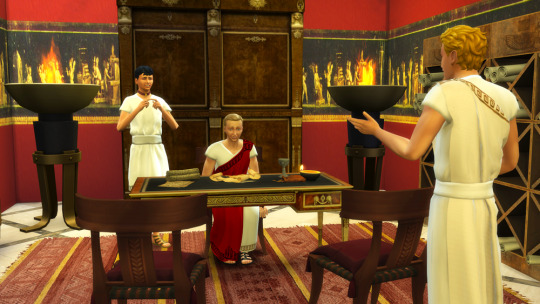
“Clodius!” he cried breathlessly. “Clodius has agreed to prosecute Catalina!”
Cicero was stunned. Publius Clodius Pulcher, a young man in his early 20s, was chief among a group of disreputable noblemen (of which, sadly, young Rufus was a part) who continually drank and whored their way around the city. Clodius – a patrician Claudian who embraced the common spelling of his name as an affectation to endear himself to the head count – was rich, intelligent and exceedingly arrogant.
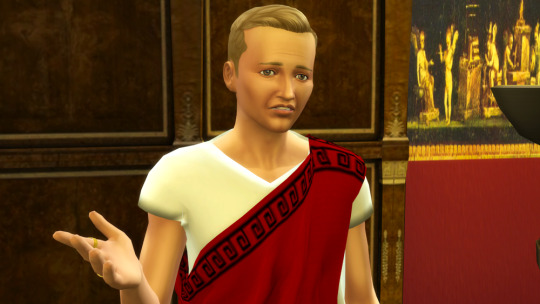
“What would such a creature be doing in a law court?” Cicero joked, standing to face his guest. “Except as a defendant, of course.”
But Rufus defended his friend.

“Say what you will, but Clodius is brilliant,” he said. “If you need greater proof, just plan on visiting the extortion court tomorrow morning.”
Cicero was determined to be there, and, just after sunrise, dragged me to the forum to watch.
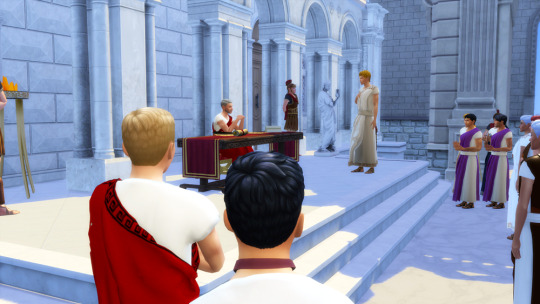
Soon after, a group of young men strode regally across the forum to the court’s table. One of them, a golden-haired Adonis, stepped forward, and his voice rang out.

“I am Publius Clodius Pulcher, son of Appius Claudius Pulcher, consul,” he said, his voice deeper and more resonant than his look would suggest. “I come before you to lay charges against Sergius Catalina for the crimes he committed in Africa. That province and its people demand justice!”
His friends applauding, Clodius turned on his heel and marched off through the surprised crowd, leaving Cicero shaking his head. He turned to me.
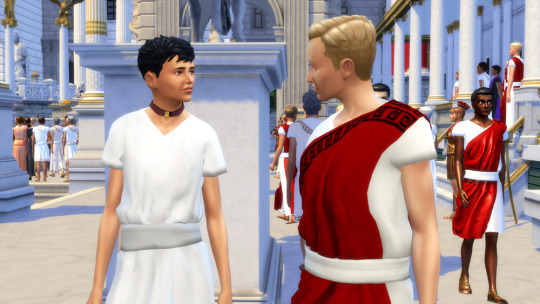
“Go, find my brother and Atticus,” he said. “Have them meet me at home at once.”
BEGINNING | PREV | NEXT
#ts4 story#ts4 simblr#simblr#historical simblr#ts4 historical#ancient rome#marcus tullius cicero#prosecuting catalina#publius clodius pulcher#marcus caelius rufus#chapter 56#catalina
6 notes
·
View notes
Text
Consulting the Coop: Ancient Rome’s Sacred Chickens and Big Decisions
When faced with a decision there are typically two ways to proceed, you evaluate the options for yourself and choose the best avenue or you might feel the need to ask advice from a trusted source. This source can be anyone, a relative, friend, coworker, counselor, or…if you were living in one specific timeframe…you headed right for the chicken coop.
Ancient Rome can conjure majestic images of architecture, artwork, and bring to mind familiar names of great intellectuals and mighty leaders like Caesar, Cicero, Marcus Aurelius, Claudius, and Augustus. Considering how immense and powerful Rome was, it might be surprising how reliant it was on superstition and reading “signs” given to them by the gods. The Romans often took part in augury, using the outcome of various practices and rituals as predictions of the future. Some practices involved reading the entrails of animals, some may have looked at plant leaves, others may have studied storms, but one of the most common forms of this type of divination involved birds, and in ancient Rome the most vital of these birds were chickens.
After being relocated from their home near Athens, the chickens were tended to by a pullarius, a “priest of the sacred chicken”, and it was these priests that became responsible for some major decisions in Roman history. The process was straightforward, the chickens were kept in pens and were denied food for a certain amount of time. When there was an important decision to be made the pullarius fed the chickens grain. If the hungry birds ate the grain it signaled a “yes” to the question. But, if they did not eat it was a definite “no” and it was highly advised that a new avenue be considered.
But what if they did not listen to the chickens? What could possibly go wrong? The birds were presented with questions on every level, including ones that carried an immense amount of weight and heavy consequences for Rome. On more than one occasion they were not listened to and those who defied the sacred chickens were left with deep regret.
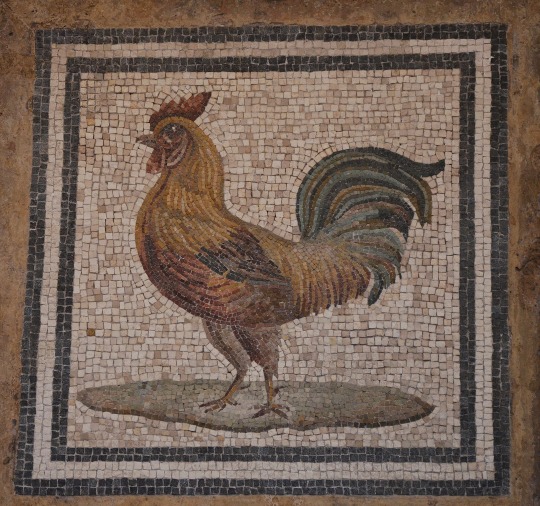
Ancient Roman mosaic of a rooster. Image commons.wikimedia.org.
At the beginning of the First Punic War (264-241 BCE) the Roman navy’s biggest obstacle was the far superior naval force of Carthage that boasted better ships and more advanced sailors. One thing that Rome did have in its favor was a gift for engineering and tactics which eventually gave them a fleet of ships that could challenge the Carthaginian ships. By 249 BCE the fleet of 123 ships had a number of impressive victories under its belt and was under the command of Publius Claudius Pulcher. When Pulcher successfully cornered the Carthaginian navy in the harbor of Drepanum he had two options, to sit in wait creating a blockade or, his preferred choice, to launch a surprise attack. He knew who he had to ask. Pulcher happened to have some sacred chickens on his ship, but their reaction to his inquiry did not please the admiral. They refused to eat the grain given to them…an ambush was not advised.
Pulcher’s next step would have appalled many in Rome. The chickens very clearly advised him not to attack the Carthaginian fleet. But, not only did he go against the chickens, he may have outright disrespected them. According to some records, when the birds refused their grain he said to his crew “If they will not eat, let them drink!” before throwing them into the sea.
The attack on the fleet of Carthage was devastating for Pulcher. Of the 123 ships he brought into battle only 30 survived and up to 20,000 men were lost, decimating the Roman navy and destroying all the headway and moral they built during their previous victories. Pulcher survived the ordeal but when he returned to Rome he was heavily fined for his actions and accused of treason.
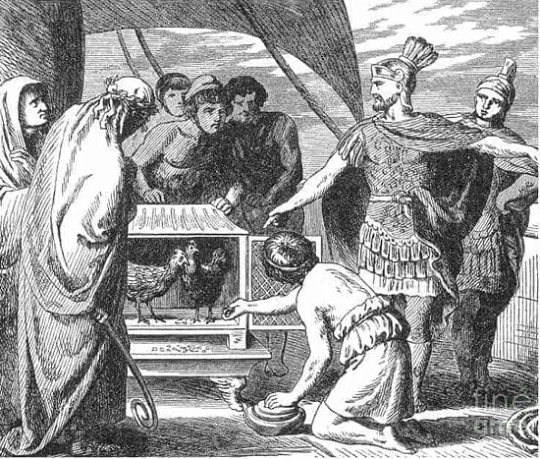
An illustration of Pulcher consulting the sacred chickens. Image via https://www.weirduniverse.net/blog/comments/sacred_chickens_of_rome
In the year 137 BCE Gaius Hostilius Mancinus was the Roman consul during the Numantine War. Before engaging in a campaign against the Numantians in Spain Gaius went to consult the sacred chickens about his plans. There were typically two outcomes here, the chickens ate the grain or they did not. This time however, the chickens did not even consider the grain. Instead they ran straight into the surrounding woods and could not be found. This should have been a very clear answer to Gaius telling him his campaign was not looking favorable. But instead, he went on to battle. What followed was a military disaster for Gaius. They were beaten in battles several times over, they failed to build a camp, and by daybreak they were completely surrounded by the enemy. The situation could have spelled utter doom for the Romans, but among them was the son of a man named Tiberius Sempronius Gracchus, a man the Numantians were familiar with and held in high regard. To save thousands of lives Gaius had to agree to a peace deal with his opponents, sending him and his army crawling back to Rome and leaving all of their belongings behind. When Gaius appeared before the Senate, they were furious with him and the embarrassment of his dealings with the Numantians. Gaius was stripped naked, put in chains, and the new Roman consul was ordered to bring him back to the Numantians in Spain. Once there, they refused to receive him. Gaius eventually returned to Rome where he lived out the rest of his years forever marked with humiliation. Plutarchus later dubbed him “the most unfortunate of the Romans.”

The sacred chickens of Rome in their coop from an engraving of military insignia and instruments of war by Nicolas Beatrizet. The full engraving is found at Speculum Romanae Magnificentiae, [Image no. B293], Special Collections Research Center, University of Chicago Library.
Tiberius Gracchus was a controversial Roman politician for his time. While serving as Tribune of the Plebs he proposed a land reform bill that sought to transfer land from wealthy landowners to poorer citizens, much to the chagrin of the Senate. By 133 BCE Tiberius was seeking a second term to continue his cause and on the day of the election he traveled to Campus Martius for the vote. Before leaving though he made sure to consult the family chickens to ask if he should attend at all. The chickens told him he should not go. He should have listened to them.
Things soon began to go bad for Tiberius. As he left his house he stubbed his toe badly, bloodying his shoes as he continued to the assembly. When he arrived at the Capitol he was informed of some dire news, that some opponents in the Senate had hatched a plan to kill him. Arming themselves with anything they could find, Tiberius and his followers braced themselves. In the massive crowd it is said Tiberius pointed to his head to signal he was in danger, but his enemies took the sign as him saying he wanted to be crowned king. The heated senators had had enough. They and their followers armed themselves and headed for Tiberius and his supporters. What followed was the eruption of a massive riot that resulted in the deaths of approximately 300 people. One of the dead was Tiberius, he had been beaten to death and his body thrown into the Tiber. The death of Tiberius, the blatant murder of an elected official, was shocking and it marked the beginning of the end for Rome.
As Rome transformed over time, moving from Republic to Empire, their methods and customs changed. While augury remained a presence in Roman culture the practices moved away from the sacred chickens until eventually divination as a whole became frowned upon with the onset of Christianity.
Today anyone looking for answers through divination has many methods to choose from ranging from decks of cards to reading animal bones and everything in between. Greatly missing from today’s list of options are the sacred chickens, the common birds responsible for some of the biggest moments in Ancient Roman history.
**********************************************************
Sources:
The Sacred Chickens of Rome by Paul Sheridan https://www.anecdotesfromantiquity.com/the-sacred-chickens-of-rome/
The Sacred Chickens of Rome https://www.weirduniverse.net/blog/comments/sacred_chickens_of_rome
The Sacred Chickens that Shaped Roman Decision-Making by Alexander Meddings https://historycollection.com/sacred-chickens-shaped-roman-policymaking/
The Disgraced Ancient Roman Admiral Who Did Not Heed The Sacred Chickens During The First Punic War https://thehistorianshut.com/2018/09/14/the-disgraced-ancient-roman-admiral-who-did-not-heed-the-sacred-chickens/
History with the Szilagyis Episode 3: The Sacred Chickens of Rome https://historywiththeszilagyis.org/hwts003
#HushedUpHistory#featuredarticles#history#historyclass#AncientRome#AncientRomanHistory#chickens#divination#augury#predictthefuture#HistoryofAncientRome#SacredChickens#AncientRomanMilitaryHistory#predictions#sacredanimals#chicken#historicchickens#historicanimals#animalsinhistory#historyisweird#weirdhistory#strangehistory#forgottenhistory#historyiswild#historyisfun#truthisstrangerthanfiction#truestory#psychicchickens#whataretheodds#goodadvice
4 notes
·
View notes
Text
Here’s my personal working order of birth for the children of Appius Claudius Pulcher (c. 129 BC – 76 BC):
Clodia Metelli, to wife 1
Unrecorded sister, during/after who’s birth wife 1 died
Appius Claudius
Claudia Tertia, to wife 2
Gaius Claudius
Publius Clodius
Claudia former wife of Lucullus
#they’re all quite close in age#mags babs#category 7 pcp moment#this is the order that gives max drama to me. so it’s the one I believe in. xoxo
1 note
·
View note
Text
Do you ever think about how Appius Claudius Pulcher was an election-rigging necromancer and Publius Clodius Pulcher was a crossdressing mob boss and their little brother Gaius was just some guy
#appius claudius pulcher#publius clodius pulcher#gaius claudius pulcher#just roman memes#my phone keeps trying to correct 'pulcher' to 'puncher' and it is. not entirely wrong
110 notes
·
View notes
Text
can you imagine being a roman commander in charge of a naval fleet in 249 BCE and you’re facing off against your mortal enemy, the carthaginians, and shit’s exhausting and you’ve been at this for a couple of decades already and neither side is winning and you’re just so tired because there’s no end in sight and some fucker has brought some sacred chickens on your ship for some kind of ceremony of divining or as part of a ritual to the gods that will boost your moral and help bring you to victory and that’s nonsense, you think, so you throw the fucking chickens overboard and tell your men to get back to work.
except then you lose the battle of drapana and literally everyone blames you. not because you failed as a commander or your strategies were shit or you didn’t have the resources you needed, no, but because you threw the sacred chickens overboard and clearly you invited divine wrath and it’s all your fault
and then for the next 2000 years your petty tantrum of throwing some chickens off a boat is literally part of history and the only thing anyone remembers about you
#shoutout to publius claudius pulcher. him and his sacred chickens#(he could have just had them cooked. why waste a good chicken like that)#Syra's school adventures#literally hysterical to me that the only mention of this guy or this battle in my textbook#(already a brief history. literally titled the roman republic: a very short intro)#is just one line saying this guy lost the battle because he invited divine wrath by throwing some sacred chickens overboard#the fact that this has apparently been every bit of an enduring joke as dragging ea nasir's name....#had to submit a reflection journal on my reading assignments for this class and i used this line because. literally wtf#my teacher's only comment back on the assignment: ''the sacred chickens get me every time too''#HISTORY#@shane madej: puppet history episode about sacred chickens when#i know you find your episode ideas on tumblr there's no way you did dancing plague molasses flood AND#cursed stewardess who outlived the titanic britanic AND olympic. without having been here when those posts were going around
33 notes
·
View notes
Text
you can throw a sacred chicken in the ocean but you can't make it drink
45 notes
·
View notes
Note
Natalie can you tell us something really stupid about the Roman empire?
Romans were extremely superstitious and put a lot of stock in omens and portents, and it was common practice to consult the auguries before doing anything difficult or noteworthy. At the Battle of Drepana during the Punic Wars, the Roman naval commander Publius Claudius Pulcher did this by consulting his ship's sacred chickens; the idea being that you scatter grain in front of the sacred chickens, and if they eat it that's a good sign, but if they refuse to eat it's a bad sign. The sacred chickens refused to eat, signifying that battle should be avoided that day, so Pulcher threw them overboard and declared, "If they are not hungry, let them drink," then gave the order engage the Carthaginians.
Drepana was one of the most disastrous naval defeats in Roman history, costing the republic 93 ships and 20,000 sailors in a single day.
10K notes
·
View notes
Text
Famous people
Tag list of famous people from Ancient Rome and Greece. A few hellenistic rulers and some Etruscans are also included.
And for some reason the page is not working properly. The HTML code is there, but it only works on my dashboard. On this page links are inactive. I figure that page only understands “/tagged/Agrippina-the-Elder” - versions, but I’m too lazy / busy to rewrite the code. So if you want to check a tag, you’ll have to copy and paste it after the word “ .../tagged/”. And same goes for all the lists below.
URLs + copy&paste:
https://romegreeceart.tumblr.com/tagged/
https://romegreeceart.tumblr.com/archive/tagged/
A
Aelia Flaccilla- Pillar of the Church
Agrippina the Elder
Agrippina the Younger
Aemilia Lepida and her descendants v emperor Nero
Aeschylus
Aetius
Alaric
Alcibiades
Alexander the Great
Ancus Marcius
Antinous
Antiochus I Soter
Antiochus III the Great
Antisthenes (philosopher, cynic school)
Antonia Minor - mother of Claudius and Germanicus
Antoninus Pius
Apicius
Apollodorus of Damascus
Apollonius of Tralles (Greek sculptor)
Aristotle
Arsinoe II
Arsinoe III
Artemisia II of Caria
Aspasia
Atticus (Cicero’s friend)
Attila
Augustus
Aulus Rustius Verus (Pompeian politician)
Aurelianus
B
Baltimore painter (Apulia, 4th century BCE)
Berenike II
Britannicus
Brygos Painter
Brutus (liberator, founder of the republic)
Brutus (assassin)
C
Caesarion
Caligula
Callimachus
Caracalla
Carausius (Roman Britain, emperor)
Carinus
Cassius Dio
Catiline
Cato the Elder
Cato the Younger
Cicero
Claudia Antonia (emperor’s daughter)
Claudius
Claudius Gothicus
Cleopatra
Cleopatra Selene
Cleopatra III
Clodius Albinus
Commodus
Constantine the Great
Constantius II
Constantius Chlorus
Corbulo
Cornelia Africana
Cornelia Minor (Caesar’s wife)
Crispina
Crispus (Constantine’s eldest son)
Croesus
Cynisca (Spartan princess, olympic winner)
D
Darius III
Decius
Demosthenes
Didia Clara (daughter of Didius Julianus)
Didius Julianus
Diocletianus
Dioscorides Pedanius (physician, botanist)
Diva Claudia (daughter of Nero)
Domitianus
Drusus Caesar (son of Germanicus)
Drusus the Younger (son of Tiberius)
Drusus the Elder (son of Livia)
E
Elagabalus
Eumachia (Pompeian priestess and patroness)
Euripides
F
Fabius Maximus Cunctator (”The Shield of Rome”)
Faustina Maior
Faustina Minor
Female painters
Flavian dynasty
G
Gaius Caesar
Galerius
Galba
Galen
Galla Placidia
Gallic emperors
Gallienus
Germanicus
Gelon
Gens Aemilia
Gens Cornelia
Gens Calpurnia
Geta
Gordian I
Gordian II
Gordian III
Gracchi Brothers
Gratian
Greek tyrants
H
Hadrianus
Hannibal
Hegias (Greek sculptor, 5th century BCE
Hellenistic kings
Herennius Etruscus (co-emperor)
Hermione Grammatike
Herodes Atticus
Herodotus
Hippocrates
Historians
Homeros
Honorius
Hostilianus
I
Iaia of Cyzicus (female painter)
Jovianus
Juba II
Julia (Augustus’ daughter)
Julia Aquilia Severa (Vestal virgin and empress)
Julia Domna
Julia Drusilla
Julia Felix (Pompeian business woman)
Julia Flavia (Titus’ daughter)
Julia Maesa
Julia Soaemias
Julian the Apostate
Julio-Claudian family (julioclaudian)
Julio-Claudian dynasty
Julio-Claudian
Julio-Claudian dynasty
Julius Caesar 1
Julius Caesar (2)
Julius Vindex
K
Kings
Kresilas (Athenian sculptor)
Kritios (Athenian sculptor)
L
Lady of Aigai
Lady of Vix (Celtic woman, late 6th century BCE)
Lassia (priestess of Ceres, Pompeii)
Lepidus
Leonidas
Livia
Livilla
Livius
Lucilla (daughter of Marcus Aurelius)
Lucius Appuleius Saturninus
Lucius Caecilius Jucundus (Pompeian banker)
Lucius Caesar
Lucius Herennius Flores (Boscoreale Villa, real owner ?)
Lucius Verus
Lysippos
Lysippos 2
M
Maecenas
Macrinus
Magnus Maximus
Mamia (Pompeian priestess and patroness)
Marcellus (Augustus’ heir)
Marcus Agrippa
Marcus Antonius
Marcus Aurelius
Marcus Claudius Tacitus (emperor)
Marcus Licinius Crassus
Marcus Terentius Varro
Marius
Martialis
Masinissa
Maussollos of Halicarnassos
Maxentius
Maximianus
Maximinus Daia
Maximinus Thrax
Members of imperial families
Menander
Miami painter
Milonia Caesonia
Miltiades (Greek general)
Mona Lisa of Galilee
Myron
N
Nero
Nero Julius Caesar (son of Germanicus)
Nerva
Nerva-Antonine family
Numa Pompilius
O
Octavia the Younger (Augustus’ sister)
Octavia (Claudius’ daughter)
Optimates
Otho
Ovidius
P
Paionios (Greek sculptor)
Patronesses
Penthesilea painter
Pericles
Pertinax
Pescennius Niger
Pheidias
Philip the Arab
Philosophers
Philip II of Macedonia
Phryne (Greek courtesan)
Plancia Magna
Plato
Pliny the Elder
Pliny the Younger
Poets
Polykleitos
Pompeius
Poppaea Sabina
Populares
Postumus Agrippa
Postumus (Gallic emperor)
Probus
Ptolemy of Mauretania
Praxiteles
Ptolemy I
Publius Clodius Pulcher
Publius Fannius Synistor
Publius Licinius Crassus (triumvir’s younger son)
Publius Sittius
Publius Quinctilius Varus
Pythagoras
Pyrrhus
Pytheas (a greek explorer)
Q
Queens
R
Roman Caesars (= princes, heirs to the throne)
Roman Civil War Commanders
Roman client kings
Roman consuls
Roman dictators
Roman emperors
Roman empresses
Roman generals
Roman gentes
Romans who declined the throne
Romulus Augustulus
Romulus and Remus
S
Sabina
Sallustius
Sappho
Scipio Africanus
Scopas
Sejanus
Septimius Severus
Seven sages
Severan dynasty
Severus Alexander
Sextus Pompeius
Shuvalov painter
Silanion ( Greek sculptor)
Socrates
Solon
Sophocles
Stilicho
Strabo
Sulla
Sulpicia (Roman female poet)
T
Tacitus
Tarpeia
Tarquinius Superbus
Themistocles
Theodosius
Theophrastus
Thucydides
Tiberius
Tiberius Claudius Verus (Pompeian politician)
Tigranes the Great
Titus
Titus Labienus
Titus Tatius
Titus Quinctius Flaminius
Trajanus
Trebonianus Gallus
Tribunes of the plebs
U
Ulpia Severina (interim sovereign in 275 CE)
Urban prefects
Usurpers
V
Vaballathus (Palmyran king)
Valens
Valentinianus I
Valentinianus III (murderer of Aetius)
Valerianus
Valeria Messalina
Vel Saties
Velia Velcha (“Mona Lisa of antiquity”)
Velimna family (Hypogeum, Brescia)
Vercingetorix
Vergilius
Vespasianus
Vibia Sabina
Vipsania Agrippina
Viriathus (Lusitanian freedom fighter)
Vitellius
Volusianus
X
Xenophon
Y
Z
Zenobia
183 notes
·
View notes